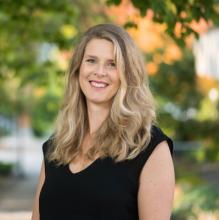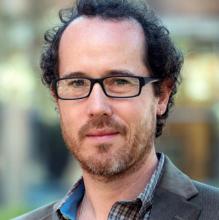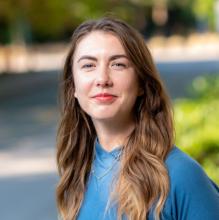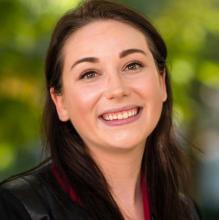The PSI Program gives scholars institutional support to move beyond traditional modes of academic scholarship, encouraging experimentation with new modalities of thinking and research. Beyond the financial support of the award, it's wonderfully freeing to be able to take risks and push beyond the status quo, knowing that the PSI is there to enthusiastically advocate on my behalf.
Research Description
The Armenian Genocide of 1915 killed over 1 million Armenians and removed almost all traces of Armenian peoples from what is now Central and Eastern Turkey. Genocide survivors dispersed to enclaves around the world and their descendants comprise the bulk of the current diaspora. Because of the complicated histories of forced deportation and genocide, questions surrounding identity (what does it mean to be Armenian?) and how and if those questions are expressed through one’s music make for a highly volatile terrain, one which has received little attention by scholars. Utilizing a three-pronged methodological approach that combines historical musicology, ethnography (with community-based/amateur and professional musicians), and public-facing, dialogue-provoking creative works, my research will show how music throughout the Armenian diaspora is shaped by the influence of surrounding political, cultural and societal pressures. By viewing post-genocide communities through the lens of political theorist Iris Marion Young's "Five Faces of Oppression" (exploitation, marginalization, powerlessness, cultural imperialism, and violence) this research will illustrate how each Armenian community (whether in Lebanon, New York, Los Angeles or Yerevan) evolved in culturally and politically distinct environs. Out of necessity, Armenians responded to these oppressions in various ways, expressed through the sounds that Armenian musicians produced. The influence of these historical responses is still reflected in the variegated sonic palettes of contemporary Armenian artists.
What does being a Public Scholar mean to you?
The PSI Program gives scholars institutional support to move beyond traditional modes of academic scholarship, encouraging experimentation with new modalities of thinking and research. Beyond the financial support of the award, it's wonderfully freeing to be able to take risks and push beyond the status quo, knowing that the PSI is there to enthusiastically advocate on my behalf. Moreover, the PSI community provides opportunities to dialogue with experts in other subject areas, all of which influence my current work. Sometimes ideas from very divergent fields can have deep relevance within one’s own in unexpected ways.
In what ways do you think the PhD experience can be re-imagined with the Public Scholars Initiative?
The Public Scholars Initiative brings creative and innovative thinking within the academy to the fore. More than just having an original idea, scholars are encouraged to dream of new ways that their work can be developed. In my view, the PSI has an essential role in helping to decolonize the power structures at UBC, through its celebration and encouragement of knowledge systems and practices that are either outside of or at the periphery of the academy.
How do you envision connecting your PhD work with broader career possibilities?
In my previous work as a musician (I was a guitarist who performed with Lou Reed and Diana Krall) and as a curator (at Western Front, one of Canada's leading artist-run centers for experimental art and music) I was constantly searching for and making connections. There is a certain type of hustling that is part and parcel of being a professional musician, and so I'm used to seeing possibilities in unusual places. To this end, I don't see a tenure track position as the sole purpose of my PhD research. As my work involves heritage reclamation and the complexities of inner-diaspora dialogues, I foresee a whole host of non-academic applications for post PhD life, particularly in the non-profit sector. Whatever my post-PhD life looks like, I hope that it grows with the ethos of community building at its core.
How does your research engage with the larger community and social partners?
After the Armenian genocide of 1915, Armenians spread throughout the world, forming communities in Beirut, Aleppo, Boston, Los Angeles and other cities. As Armenian scholar Sylvia Alajaji found in her research, if you ask an Armenian in any of these regions what they think Armenian music is, you're likely to get a different answer. This is something that caused tensions within the diaspora as Armenians throughout the world met. My work seeks to build on this premise, and to make connections between Armenian organizations in different locales to share how each of these musical perspectives are reflective of the diversity of the Armenian people, something to be celebrated and highlighted, rather than admonished.
Why did you decide to pursue a graduate degree?
The questions that I'm pursuing in my work have been gestating in my mind for close to a decade. When I moved to Canada and began hearing land acknowledgements regularly at events in Vancouver, it dawned on me that me grandfather's ancestral lands in what is now Central Turkey, are also unceded. There is a mountain near where he was born, called Karabçak, that my name is derived from. I've often wondered if this is where my ancestors originally from. These kinds of questions and inquiries have developed and grown over the years as I've observed how different Armenians throughout the diaspora have used music as a means of expression in different ways. My PhD is a further in-depth exploration of these questions. In addition to exploring music in the diaspora, I hope to examine how questions surrounding Armenian identity relate to with Indigenous studies, migration studies and cultural studies.
Why did you choose to come to British Columbia and study at UBC?
I had been discussing my research over the years with my current advisor, ethnomusicology professor Dr. Nathan Hesselink. His attentiveness and interest was of course, an important factor. In addition the Armenian community in greater Vancouver reflects the diverse range of the diaspora as a whole. I've met Armenians here from Soviet Armenia, Lebanon, Iran, Romania, and Syria. Unlike the community of Armenians near Boston, where I grew up, many of the Armenians here are first generation immigrants and have a different perspective on music than musicians I've interacted with on the East coast. Not only are these perspectives fascinating from a historical perspective, but they also help to balance some of the larger perspectives and overarching themes within the diaspora.





